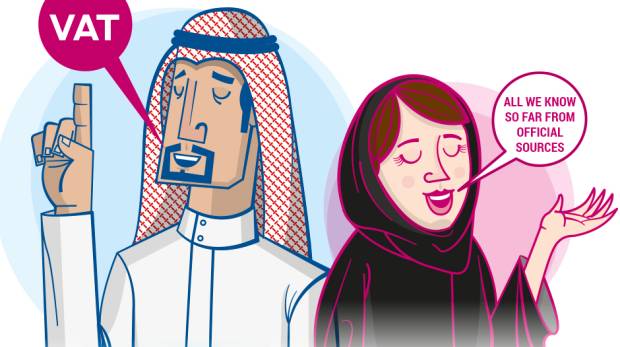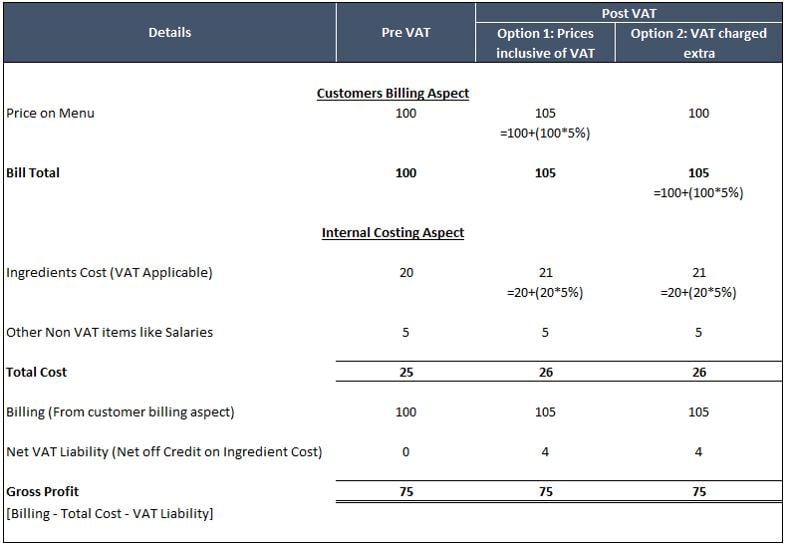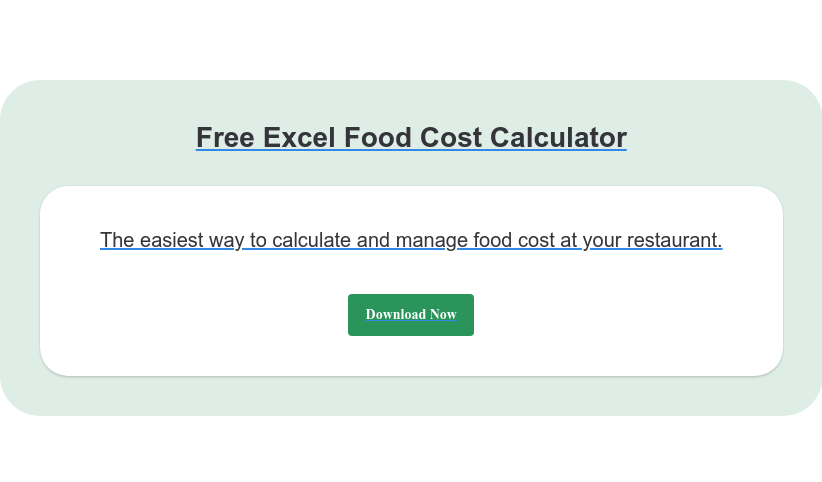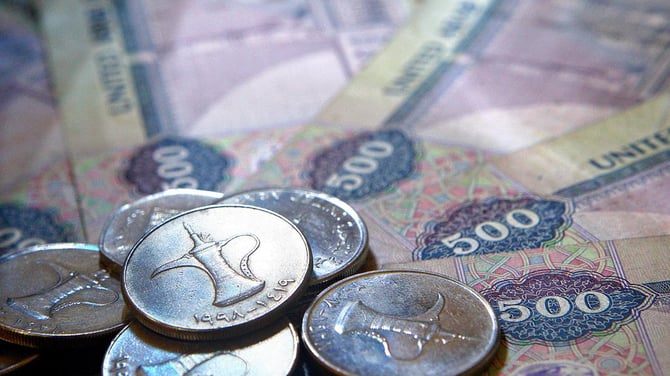With VAT officially going into effect on January 1st 2018 in the UAE, now is a good time for all businesses, including restaurants, to take steps towards a proper implementation of VAT in their business processes. Restaurants should be ready with trained finance professionals or external consultants to update their account software to issue tax invoices to their customers.

For restaurants, this implementation is most challenging as the switch occurs during their busiest day of operation, December 31st at midnight. Making them the first set of businesses to implement the tax as they do not have the liberty to delay issuing invoices to their customers.
What is VAT?
In simple words, Value Added Tax (VAT) is a tax on goods and services levied when goods and services exchange hands. VAT Framework allows the seller of goods and services to take credit of all VAT paid by him/her on purchases and expenses thereby giving seller the burden of tax on only the value added by the seller. That is why it is called Value Added Tax.
VAT will be introduced across the UAE on 1 January 2018 at a standard rate of 5%. VAT, as a general consumption tax, will apply to the majority of transactions of goods and services unless specifically exempted or excepted by law.
Registration
A business must register for VAT if their sale of taxable goods and services exceeds AED 375,000.
At aggregate receipts of AED 1,000 per day or above, the restaurant would be required to register with FTA.
Tax Invoice
A supplier registered or required to be registered for VAT must issue a valid VAT invoice for the supply. To be considered as a valid VAT invoice, the document must follow a specific format as mentioned in the legislation. In certain situations, the supplier may be able to issue a simplified VAT invoice. The conditions for the VAT invoice and the simplified VAT invoice are mentioned legislation.
Restaurants can confirm with the accounting/billing software provider to update to meet the invoice requirement. Also, perform necessary setup in the accounting/billing software to be able to issue proper tax invoice from 31st December midnight. An ideal solution would be to setup VAT in the software well in advance keeping the VAT rate at 0% and then changing it to 5% on December 31st at midnight. Also taking final orders at 11:45 pm on 31st December, and the bill to be printed before midnight at 0% VAT.
However, should a diner wish to stay past midnight, the bill will then be raised with 5% VAT.
Input VAT Credit
We already have discussed concept of Input VAT Credit.
VAT on expenses that were incurred by a business can be deducted in the following circumstances.
- The business must be a taxable entity (the end consumer cannot claim any input tax refund).
- VAT should have been charged correctly (i.e. unduly charged VAT is not recoverable).
- The business must hold documentation showing the VAT was paid (e.g. valid tax invoice).
- The goods or services acquired are used or intended to be used for making taxable supplies.
- VAT input tax refund can be claimed only on the amount paid or intended to be paid before the expiration of 6 months after the agreed date for the payment of the supply.
Revision of Prices in Menu
Restaurants have two options to display prices in their menu.
Option 1: To display prices inclusive of VAT. Recommended for fast food joints.
Option 2: To display the prices in menu with footnote on each page of menu saying VAT at 5% will be extra. Recommended for fine dining restaurants.
Restaurants opting for option 1 can directly increase their menu prices by 5% to take into account the increase from VAT. Although questions would arise as to whether or not the benefit of input tax credit would affect how restaurants should increase their pricing.
Restaurants opting for Option 2 do not need to change the price, a simple footnote on each menu page stating an extra 5% would be added for VAT is sufficient.
To understand both scenarios, refer to the image below comparing how each implementation is handled.

Whichever option you choose, you're definitely going to need to reevaluate all of your dishes from a cost standpoint. Keeping food cost low is already hard enough for restaurant operators, the implementation of VAT doesn't make that any easier.
We recommend checking food cost of all your dishes regularly to ensure the VAT doesn't end up digging into your savings. 
Price Increase Impact on Customers
As per the guidlines set by the VAT decree, the following two situations can occur.Customers who are planning on claming a restaurant bill as a business expense wouldn't need to worry about the VAT. The extra payment towards VAT on restaurant bills, will be taken as credit against their own VAT liability in the future.
Customers who are spending their own money at restaurants would not have any advantage to take credit from VAT paid on restaurant bills and hence that may affect their spending patterns.
Import of Goods and Services
VAT is due on the goods and services imported to UAE.
In case the recipient is a registered person with the Federal Tax Authority for VAT purposes, VAT would be due on that import using a reverse charge mechanism. VAT shall be payable in addition to the custom duties paid by the importer of the goods and cannot be deducted. VAT shall be computed on the value that includes the customs duties.
For restaurants importing raw material, ingredients, and services from outside UAE, they need to pay VAT themselves on reverse charge mechanism. However, they can claim the input credit of such tax paid on imports against their VAT liability in future return.
Books and Records
Any taxable person must retain VAT invoices issued (to customers) and received (and taken credit for) for a minimum of 5 years.
The accounting software used should retain the tax invoices issued to customers automatically for you for 5 years but most importantly the received tax invoices for expense on which input credit has been availed also needs to be retained for 5 years.
Further Reading: 'Tech in F&B: The Ultimate Guide to Restaurant Management Software'
VAT Grouping
Businesses that satisfy certain requirements covered under the Legislation (such as being resident in the UAE and being related/associated parties) will be able to register as a VAT group. For some businesses, VAT grouping will be a useful tool that would simplify accounting for VAT.
Returns and Tax Payment
Each Taxable Person shall:
- Prepare a tax return for each tax period and tax within the time limit of registration in accordance with the tax law.
- Submit the tax return to the authority in accordance with the provisions of this law and the tax law.
- Settle any payable tax as specified in the tax return or tax assessment within the time frame specified in this law and the tax law.
VAT returns will be due on either a quarterly or monthly basis. Returns and payments required to be submitted within 28 days after the billing period ends.
Restaurants needs to manage their cash flow properly as they will be sitting on large amounts of cash due to accumulated VAT liability collected from all their proceeds which needs to be settled all at once after 90 days period.
Tax Assessment and Penalties
In case of non-compliance by the tax-registered business, the FTA may issue a tax assessment with the tax payable based on their own method of calculation and notify the taxable person within five business days of its issuance.
The Authority shall issue an Administrative Penalties Assessment and notify tax-registered business within five working days for various violations mentioned in Tax Procedural Law. Such administrative penalties shall be no less than 500 Dirhams for any violation and shall not exceed three times the amount of Tax in respect of which the Administrative Penalty was levied.
There will be further penalties decided by Courts in the case of tax evasion.
The FTA will also have the power to conduct VAT audits with five days’ notice, unless fraud is suspected.
Restaurants should take consultancy of tax agent well in advance to avoid such penalties. Also following up with accounting/billing software provider for updating the software in timely manner and proper training and test run would help in the process of implementing VAT without any last minute disasters.
Disclaimer
Although the information contained here is presented in good faith and believed to be correct, you should always consult with a qualified tax agent. This article is intended to serve solely as discussion on various tax topics for educational purposes, with the understanding that the author is not to be construed and are not intended to be the rendering of legal, accounting, tax advice or other professional services.
About the author
CA Dhaval Paun is a self-confident, motivated Professional and Chartered Accountant by qualification with total 9 years & 6+ years post qualification work experience in Finance and Management domain.














%20(1).webp?width=200&name=Eat%20(15)%20(1).webp)

-1.png?width=1812&height=1072&name=TripAdvisor%20%26%20More%20Bookings%20(1)-1.png)
-2.png?width=1812&height=1072&name=Google%20Bookings%20(1)-2.png)

-1.jpg?width=200&name=pexels-tidos-mes-3134448-21063847%20(1)-1.jpg)
-1.png?width=200&name=TripAdvisor%20%26%20More%20Bookings%20(1)-1.png)
-2.png?width=200&name=Google%20Bookings%20(1)-2.png)
-1.png?width=200&name=Instagram%20Bookings%20(1)-1.png)
-1-png.webp?width=200&name=Facebook%20Integration%20Rectangle%20(1)-1-png.webp)







.webp?width=200&name=download%20(1).webp)
%20(1)-2.webp?width=200&name=Eat%20(34)%20(1)-2.webp)
%20(1)-2.webp?width=200&name=Eat%20(18)%20(1)-2.webp)







.webp?width=314&height=175&name=Frame%204%20(1).webp)



.webp?width=144&height=72&name=Eat%20App%20Logo%20(3).webp)